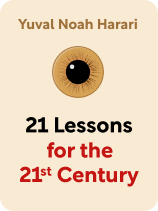

This article is an excerpt from the Shortform book guide to "21 Lessons for the 21st Century" by Yuval Noah Harari. Shortform has the world's best summaries and analyses of books you should be reading.
Like this article? Sign up for a free trial here .
What are the most noteworthy 21 Lessons for the 21st Century quotes? What are the key challenges of the 21st century, according to its author Yuval Noah Harari?
In 21 Lessons for the 21st Century, Yuval Noah Harari highlights the biggest challenges in the modern world and offers advice on how to tackle them. The following 21 Lessons for the 21st Century quotes highlight some of his key ideas about making sense of and navigating these transitional times.
Keep reading for 21 Lessons for the 21st Century quotes by Yuval Noah Harari.
21 Lessons for the 21st Century: Quotes by Yuval Noah Harari
“Morality doesn’t mean ‘following divine commands’. It means ‘reducing suffering’. Hence in order to act morally, you don’t need to believe in any myth or story. You just need to develop a deep appreciation of suffering.”
In discussing morality, Yuval draws the distinction between two conceptions of God: the cosmic God and the lawgiver God. Further, he argues that holy books such as the Bible and Quran try to draw the connection between divinity and morality by conflating the two Gods. But the truth is humans don’t need divine law or the threat of hell in order to act morally. Morality is baked into the DNA of humans and all social animals.
“At present, people are happy to give away their most valuable asset—their personal data—in exchange for free email services and funny cat videos. It’s a bit like African and Native American tribes who unwittingly sold entire countries to European imperialists in exchange for colorful beads and cheap trinkets.”
In this digital age, data is the most valuable asset but people are giving it away without regard for the consequences. Convenient as it may be to let Google assist your purchasing choices, the consequences of massive data collection could quickly snowball. Currently, people essentially connect to a data-gathering network when they use the internet on their computers and smartphones. In time, people could become increasingly connected to a data collection network, in which devices collect biometric information 24 hours a day, starting in infancy. The data could be used to determine your insurance policies, healthcare, or your employment—and if you choose to disconnect, you could risk losing your insurance, healthcare, and job.
“First, if you want reliable information, pay good money for it. If you get your news for free, you might well be the product.
In this quote, Yuval refers to the culture of post-truth—a political climate where issues are framed in such a way so as to appeal to people’s emotions. With this in mind, paying for high-quality information is worth the investment. Everyone has a responsibility to question and investigate the information they consume, and to keep an eye out for biases they unknowingly have.

———End of Preview———
Like what you just read? Read the rest of the world's best book summary and analysis of Yuval Noah Harari's "21 Lessons for the 21st Century" at Shortform .
Here's what you'll find in our full 21 Lessons for the 21st Century summary :
- What the unique challenges of the 21st century are and will be
- Why religion can't solve these 21st-century challenges
- How algorithms like Netflix recommendations are teaching you not to trust yourself






